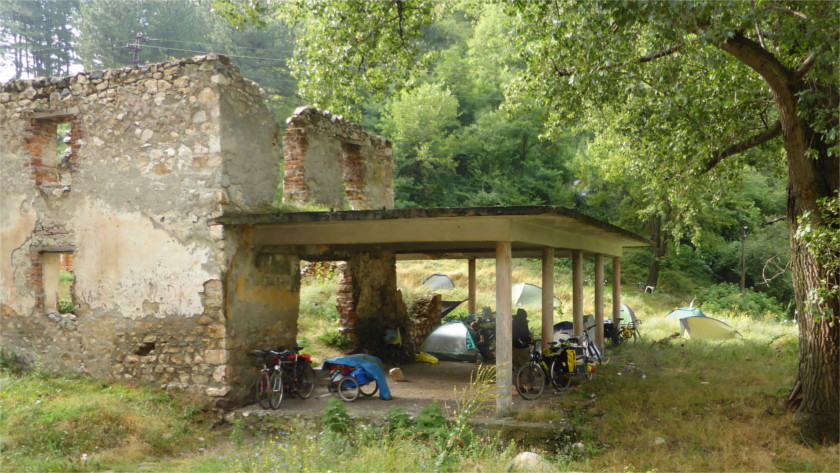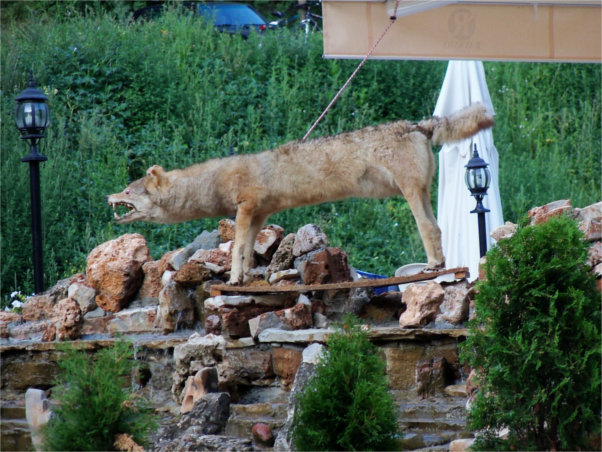On the 31st of July we cycled through a valley in south-eastern Serbia towards the border of Kosovo. Some small villages every couple of kilometers, not a lot of people on the streets, barely any traffic. The night before it had already felt weird to see a big truck or bus making their way into the darkness of the mountains every now and again, not really seeming like there was much to go to. The further up the hill we went, the more quiet it became, until suddenly we saw a big queue of trucks on the road waiting to cross the border, trucks that had passed us hours before. What do you have there, are you trying to smuggle something across the border? Ahh, it’s only a puppy, aww, he’s so cute! Oh, you want a stamp in your passport? Sorry, but when it rains, we don’t give any stamps.
Never before have I noticed such a big difference immediately after crossing a national border. Cycling into the first town, the traffic was unbelievably dense, reminding of a big city in southern Greece or Italy in the summer. We sat down in a park to have our lunch, immediately being surrounded by 20 children who did not get bored just watching us eat for an hour.
We noticed that more than half of the cars had number plates from Germany, Austria, Switzerland and sometimes Sweden. Many people fled during the war to those countries and apparently a lot of them have stayed, coming back in the summer to visit their relatives. The people tell us that half of the population of Kosovo has close relatives in Germany who send a lot of money back. The plenty of children we find speaking German as their native language remind me of hearing about a lot of cases where young Germans were deported to parts of former Yugoslavia, where they’ve never been before and whose language they don’t speak, just because their parents came from there and in 20 years never received a permission to permanently stay in Germany. It makes me sad and ashamed that some locals tell us that the Kosovans are very thankful to Germany. thankful for letting their relatives stay, at least some of them, at least for a while. Thankful for something that should be natural, to a much greater extent.
 The group decided to change the route and make a detour to Prizren in the south-west of Kosovo, instead of cycling from Prishtinë directly to Skopje. In Prizren we would meet a multi-ethnic and multi-lingual theatre group and hang out at a music festival. On the way we noticed the strong western influence on the country. Lots of things sponsored by the EU, from motorways over massive public parks down to small fridges by people selling beverages on the side of the road. ”This minefield was cleared with support from the Belgian state.” ”This sign pointing out a tourist attraction was sponsored by the EU and a German NGO.” A lot of bulletproof SUVs with EU number plates and muscular short-haired grim men passed us. In Prizren, the German military was even patrolling in the pedestrian zone of the centre.
The group decided to change the route and make a detour to Prizren in the south-west of Kosovo, instead of cycling from Prishtinë directly to Skopje. In Prizren we would meet a multi-ethnic and multi-lingual theatre group and hang out at a music festival. On the way we noticed the strong western influence on the country. Lots of things sponsored by the EU, from motorways over massive public parks down to small fridges by people selling beverages on the side of the road. ”This minefield was cleared with support from the Belgian state.” ”This sign pointing out a tourist attraction was sponsored by the EU and a German NGO.” A lot of bulletproof SUVs with EU number plates and muscular short-haired grim men passed us. In Prizren, the German military was even patrolling in the pedestrian zone of the centre.
A lot of Albanian flags passed us, attached to cars, houses, and to just about everything else, even to the border checkpoint. We rarely ever saw a Kosovan flag. 92% of the people living in Kosovo are Albanian, and the ethnic tensions of the Balkan became visible once again in a lot of Serbian street signs being sprayed over. Some people told us that the Albanian flag stands for an ethnicity, not a nation, and barely anyone would like Kosovo to belong to Albania. Those of us who used their rest day to do a day trip across the Albanian border to Kukes reported that it looks really different, everything is in a really bad state and looks like it hasn’t been touched since the 50s, whereas in Kosovo we saw so many new roads and buildings and cars.
Everywhere we went, people, particularly children, approached us to ask where we are from and how we like it here. In Prizren we camped around an abandoned house in a beautiful Canyon outside of the city center, and people really bothered to come down all the way from the street just to talk to us. It almost started feeling a bit invasive when a group of boys stood around us observing our consensus workshop and took the rocket stove to burn some plastic inside.
 I got very sick the last night and stayed behind with one other person for one more day. Groups of boys kept coming to our tent, trying to talk to us in a language that we did not speak, checking out our stuff, even trying to enter our tent, and just not leaving for ages when what we most needed was a lot of rest. In the evening we decided to pack up our stuff and try to find another camping spot at the other end of the city. It was already dark when we pitched our tents in the middle of a field, and we couldn’t believe that it did not even take 5 minutes until a group of men stood right next to our tent. They said really confusing things to us, that we should not sleep there because the Albanian mafia would shoot us because of our dog that they accused us of having stolen and feared to be a pitbull, that we should sleep in an abandoned house close by for which they would sell us mattresses, food, drinks, pills and protection from the mafia. They became really threatening for some moments, and after asking them to leave us alone for about half an hour they finally and surprisingly walked away. We decided to pack up our stuff again and went to find a place to sleep inside.
I got very sick the last night and stayed behind with one other person for one more day. Groups of boys kept coming to our tent, trying to talk to us in a language that we did not speak, checking out our stuff, even trying to enter our tent, and just not leaving for ages when what we most needed was a lot of rest. In the evening we decided to pack up our stuff and try to find another camping spot at the other end of the city. It was already dark when we pitched our tents in the middle of a field, and we couldn’t believe that it did not even take 5 minutes until a group of men stood right next to our tent. They said really confusing things to us, that we should not sleep there because the Albanian mafia would shoot us because of our dog that they accused us of having stolen and feared to be a pitbull, that we should sleep in an abandoned house close by for which they would sell us mattresses, food, drinks, pills and protection from the mafia. They became really threatening for some moments, and after asking them to leave us alone for about half an hour they finally and surprisingly walked away. We decided to pack up our stuff again and went to find a place to sleep inside.
It was a very interesting experience to visit a country with such a unique history. In the end, we are relieved to leave after having our boundaries and personal space violated so many times, but it also makes us think that most people do not have the privilege to do that. Also, my experiences in Kosovo are very influenced by my male privilege, and those among us who are perceived as being female have a whole other story to tell of being harassed on the street and completely ignored when in presence of a person perceived as a man.






